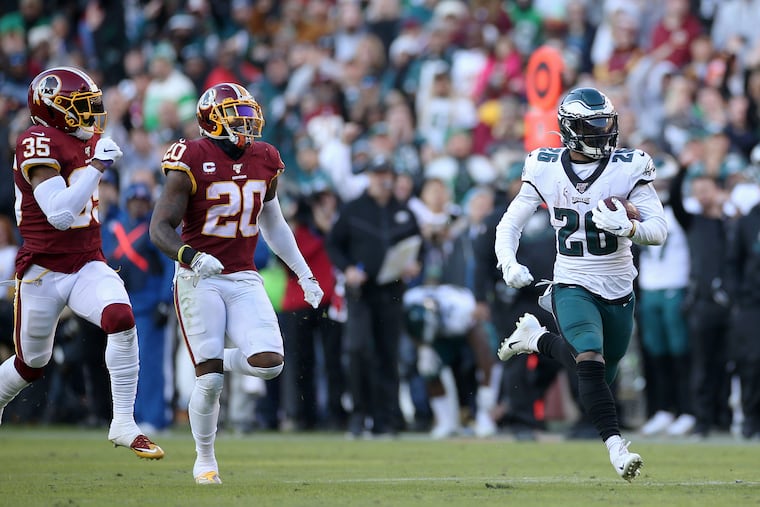How Miles Sanders and Carson Wentz can lead the Eagles for years | Marcus Hayes
Like Humphrey Bogart and Claude Reins, the Birds see a productive relationship brewing.

“I think this is the beginning of a beautiful friendship.”
That’s what Rick Blaine told Capt. Louis Renault in Casablanca, and that’s what Carson’s telling Miles today.
In their first season together, as frontline players drop all around them, franchise quarterback Carson Wentz and rookie running back Miles Sanders have pushed the Eagles to the edge of the postseason. In doing so, they’ve proved that they can provide the Eagles a backfield tandem to rival any in the NFL for the next eight years. They are marching in step.
It was obvious when they combined on the signature play of the Eagles’ season: Wentz, scrambling right, threw a 95-mph harpoon past the fingertips of two defenders that pierced Sanders’ chest in the back right corner of the end zone, a 15-yard strike that gave the Eagles the lead in middle of the third quarter.
“It was one of the most impressive throws I’ve seen honestly in my career, either as a player or a coach,” said coach Doug Pederson, who played with Brett Favre and Dan Marino. And that was only half the story: “Impressive, probably more so, [was] the catch.”
Pederson referenced three Packers playoff teams from 1994-96, on which Edgar Bennett averaged more than 1,300 yards from scrimmage in Favre’s backfield. Favre and Bennett had a connection. So do Wentz and Sanders.
It was obvious early in the fourth quarter: As Washington shifted at the line of scrimmage, Wentz stuck with the original call — a shotgun handoff to Sanders on third-and-10 at the Eagles’ 25 — and trusted Sanders to read the defenders overloaded to his right, and to outrun them to the left, a 56-yard gain that set up a touchdown.
Simpatico.
“It’s encouraging, not only for the remainder of this season but the future,” Pederson said. “But that’s what you have to have. To be successful and the teams that are successful in this league and can sustain that success. We just hope that as we grow with Carson and Miles, that we just continue to add pieces to that."
It is obvious that, for the first time in his four seasons, Wentz has someone other than tight end Zach Ertz upon whom he can regularly rely. This will be true at least through 2022, when Sanders’ rookie deal expires. If Sanders continues to play like this, the Eagles won’t let it expire. They’ll extend him. Continuity matters.
Troy Aikman would have been a modestly successful NFL footnote without Emmitt Smith, the most productive back in history. Kurt Warner might have gone back to bagging groceries if Marshall Faulk hadn’t revolutionized the running-back position as the centerpiece of Dick Vermiel’s Greatest Show on Turf. Dak Prescott has won two of the last three NFC East titles with Ezekiel Elliott on his hip. Donovan McNabb guided the Eagles to five NFC Championship Games and a Super Bowl from 2001 to 2008, but he’d never have reached them without Duce Staley and Brian Westbrook.
Sanders could be better than Staley, or Westbrook, or even the best back in team history, LeSean McCoy. With two games remaining, Sanders’ 687 rushing yards already passed McCoy’s 2009 team record for rookies (637), and his 1,120 yards from scrimmage already passed DeSean Jackson’s rookie mark from 2008 (1,008). McCoy and Jackson have nine Pro Bowls between them.
He’s not just grinding it out, either. The Eagles have 15 plays that gained at least 30 yards. Sanders has eight of them. He is the team’s most dangerous weapon, and that was true before Alshon Jeffery, Darren Sproles, Nelson Agholor, and Jordan Howard got hurt.
There’s no way the Eagles expected 1,120 yards from scrimmage and five touchdowns — with two games left — from the 53rd overall pick, a second-rounder playing with Howard, Sproles, and Super Bowl hero Corey Clement. Amid a raft of disastrous moves the past two seasons, are they surprised how well this second-rounder worked out?
“You saw the potential. You saw the talent, obviously. But this is — I don’t want to say it’s a surprise,” said Pederson, who clearly is surprised. “But it’s just encouraging.”
Why is the window eight years?
Because Wentz is already in his fourth season, and because he’s been hurt in each of the first three seasons, and because he’s not going to last as long as 40-somethings Tom Brady or Drew Brees. Wentz plays with a large degree of abandon, which puts his health at risk, and he has the pocket presence of a shell-shocked wildebeest, which is why Wentz gets sacked and fumbles so much. He’ll be 35 after eight more seasons. Steve McNair, who plays a similar game, was productive until he reached 34, and he had Eddie George in his backfield for most of his career. McNabb produced until he was 34, too.
Because Sanders, at 5-11 and 211 pounds, is an average-sized running back. He’s elusive, so, like McCoy, he won’t take a lot of direct hits, but McCoy — who is exactly the same size — was the most elusive running back since Faulk, and McCoy averaged 107 yards from scrimmage per game from his second season through his ninth. McCoy has averaged less than half that the past two seasons.
Why doesn’t Ertz, who earned a Pro Bowl berth the past two seasons, factor into this discussion? Because Ertz, now in his seventh season, will be 31 when his current deal expires in 2021. By then he will be a short-term investment if he’s not a full-time soccer fan.
Football is brutal. Football is brief.
But the window is open, and the friendship is just beginning.